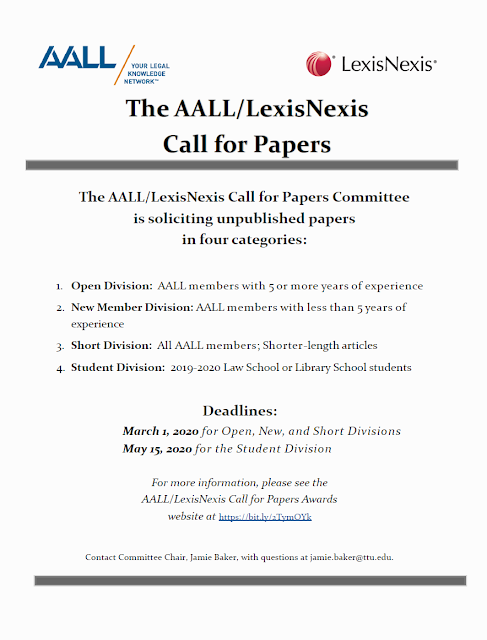Join Scribes Today!
It's no secret that I am a huge fan of Scribes - The American Society of Legal Writers. I've blogged about their helpful resources here and here.
As a member of Scribes, I get weekly tips sent directly to my email. I have been reminded of important writing concepts through these tips, and I have learned new things, too. The tips cover topics from writing, grammar, and research. If you become a member of Scribes, you will also receive these tips.
One of my favorite tips, and one that I lecture about in Scholarly Writing, is that pronouns should agree in number and gender. I provided the tip below so that you can get a taste of what you will receive if you join.
As a member of Scribes, I get weekly tips sent directly to my email. I have been reminded of important writing concepts through these tips, and I have learned new things, too. The tips cover topics from writing, grammar, and research. If you become a member of Scribes, you will also receive these tips.
One of my favorite tips, and one that I lecture about in Scholarly Writing, is that pronouns should agree in number and gender. I provided the tip below so that you can get a taste of what you will receive if you join.
DATE: June 25, 2013
Grammar Tip No. 2: Pronouns. A pronoun is a word that refers to a noun and can stand in its place. A pronoun lets you refer to the same person, place, thing, or idea without using the same noun every time.
WITHOUT PRONOUNS: Sam wondered if Sam should research the cases for Sam's brief.
WITH PRONOUNS: Sam wondered if he should research the cases for his brief.
Every pronoun must have an antecedent and must agree with that antecedent in number and gender.
Agreement in Number
If the antecedent is plural, the pronoun must be plural. If the antecedent is singular, the pronoun must be singular.
EXAMPLE: The judge wears his robes many times each week. (Since the wordjudge is singular, the pronoun that refers to the word is also singular.) If the sentence read: "The judge wears their robes many times each week," the reader would be looking back for the other judges.
EXAMPLE: The married couple believe that their cat was slightly peculiar. (Because a married couple is two people, the pronoun referring to the couple must be plural.)
Many writers want to avoid using his or her so they may start the sentence in the singular, get to the place the pronoun will appear and insert their without returning to conform the beginning of the sentence. As an example: "No one knew which judgewould be assigned. Their judicial demeanor would be important to the outcome." This grammatical error slows down the reader and reflects badly on the writer.
Agreement in Gender
A pronoun must match its antecedent in gender. If the antecedent is feminine, the pronouns she, her, and hers should be used, and if it is masculine, the pronouns he,him, and his should be used. Plural pronouns (they, them, their, and theirs) refer to plural nouns of either gender.
EXAMPLE: The attorney's father was embarrassed by his son.
The judge's mother thinks her son is cute.
The attorney's aunts took pictures of their nephew when he was sworn in.
The judge's law clerks enjoy watching their judge in court.
The words everybody, anybody, anyone, each, neither, nobody, someone, a person, etc. are singular and take singular pronouns.
Everybody ought to do his or her best. (NOT: their best)
Neither of the women brought her toothbrush to court. (NOT: their toothbrushes)
Antecedents with Conjunctions
When singular antecedents are joined by and, use a plural pronoun to refer to them.
EXAMPLE: Partners Harry and Alice are uncertain about their new associate.
When antecedents are joined by or and nor, use the pronoun required by the last antecedent.
EXAMPLES: The law clerks or the judge checked the cases cited in her opinion.
The bailiff or the law clerks did their duty and made sure the water pitchers were full.
Pronouns Should Always Have Clear Antecedents
Because a pronoun refers back to a noun and substitutes for that noun, the reader has to know which noun.
Here are some quizzes and further materials on this subject:
To receive these wonderful tips, as well as The Scrivener and The Scribes Journal of Legal Writing, become a member of Scribes today!!


Comments
Post a Comment